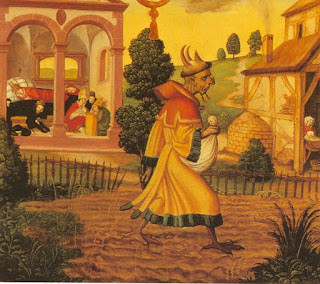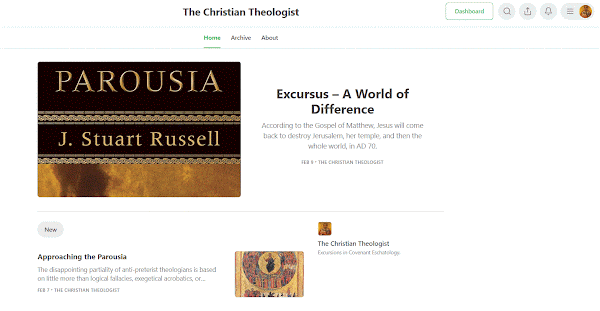Within the Divided Kingdom Inclusio: Four Soils - Four Seeds
The wider literary context of Matthew 13:31–33 reveals that, along with the wheat and the weeds, the grain of mustard, and the leaven, are two of four seeds paralleling the four soils in the Parable of the Sower.
by Heinrich Füllmaurer.
The Divided Kingdom Inclusio
Inclusio — A literary device that repeats words or themes at the beginning and end of a section. The repetition brackets the section. The Bible makes frequent use of inclusios to structure both long and short sections of text.1
The following notes are the preliminary results of an ongoing critical study on what I call the Divided Kingdom Inclusio of the First Gospel. This divided kingdom inclusio opens with the passage containing the aphorism, “Every kingdom divided against itself is laid waste, and no city or house divided against itself will stand” (Mt 12:25), and closes with the passage containing the aphorism, “A prophet is not without honour except in his hometown and in his own household” (Mt 13:57). This study began as an exegetical examination of Matthew’s Mustard Seed and Leaven parables (Mt 13:31–33).
The introduction of kingdom language prepares for Jesus’ assertion in [Mt 12:28]. The image here is of civil war within a kingdom and the desolation brought by it. It is also of something highly undesirable to the existing leadership. Parallel images of a divided town (probably a self-governing city-state is in mind) and a divided household (probably a domestic household, but possibly a royal house in the context of a disputed succession) are also offered.2
Major Themes of the Divided Kingdom Inclusio
1. Kingdom = House = Homeland = Household = Family.
2. Kingdoms (houses) are established on the words of the King (father).
3. Kingdom Treasure = Words of the King = Laws of the Kingdom.
4. Words = Seeds = Fruit = Propagation = Progeny.
5. Keep = guard, and treasury (thēsauros) = heart (mind).
6. Truth/Falsity – Good/bad – Eternal/Mortal.
7. Words spoken = treasure of the heart (mind) = Laws/King one follows/obeys = Kingdom of one’s subjection.
The Target Text: Matthew 13:31–33 (ESV)
The Mustard Seed and the Leaven
31 He put another parable before them, saying, “The kingdom of heaven is like a grain of mustard seed that a man took and sowed in his field. 32 It is the smallest of all seeds, but when it has grown it is larger than all the garden plants and becomes a tree, so that the birds of the air come and make nests in its branches.”
33 He told them another parable. “The kingdom of heaven is like leaven that a woman took and hid in three measures of flour, till it was all leavened.”
Common Assumptions of the Target Text
1. Jesus is evangelising the crowd with his profound and evocative parables (sowing good seed in their hearts).
2. Jesus is commenting solely on the character of his coming spiritual Kingdom of Heaven.
3. The mustard grain, like the seed of the Sower parable, and that of the Wheat & Weeds parable, is being planted by Jesus/God.
4. The exponential growth of the tiniest seed into the tallest tree is taken as a metaphor for the enormous potential of even the smallest efforts Christians make to further the Kingdom.
5. Similarly, the unseen leaven’s highly visible effect on the woman’s three measures of flour is taken as an image of the abundant growth God will add to any Christian’s evangelical “planting” (1Co 3:6-8; cp. 1 Co 9:10).
The Literary Context
The immediate context of the two parables above indicates that they are, respectively, the third and fourth of seven kingdom parables in the thirteenth chapter of Matthew's Gospel: The parables of the sower (Mt 13:1–9, 18–23), of the wheat and the weeds (Mt 13:24–30, 36–43), of the mustard seed (Mt 13:31–32), of the leaven (Mt 13:33), of the hidden treasure (Mt 13:44), of the pearl of great value (Mt 13:45–6), and of the net of fish (Mt 13:47–8). Widening the literary context further reveals that these seven parables have been placed within a larger section of the Gospel bracketed by the Divided Kingdom Inclusio. Examining these parables within this wider context exposes a planting-propagation motif shared by the first four that makes them quite distinct from the other three. Careful exegesis of this quartet of planting-propagation parables leads to the conclusion that, along with the “good seed” and the “weeds” from the second parable, the “grain of mustard,” and “leaven,” of the third and fourth parables, are two of four seeds, whose moral ratio of good-to-bad provides a parallel to that of the four soils in the first parable.
Contextual Evidence Countering the Assumptions
1. Mt 13:10–16 (fn. Is 6:9–13). Mt 13:34 –35 (fn. Ps78). Is 6:11–13:
11 Then I said, “How long, O Lord?” And he said: “Until cities lie waste without inhabitant, and houses without people, and the land is a desolate waste, 12 and the LORD removes people far away, and the forsaken places are many in the midst of the land. 13 And though a tenth remain in it, it will be burned again, like a terebinth or an oak, whose stump remains when it is felled.” The holy seed is its stump.
2. Further to the 2 fns. above, the 4 Soils: hardpack, rocky, thorny, good (receptive); mirrored chiastically by the 4 seeds: good seed (kalos sperma, ergo from a good tree, cp. 1Jn 3:9–10), weed (zizanion), grain (kokkos), leaven (zumē). Note the same ratio of good soil/seed is 1:4.
10.29 σπέρμαb, τος n: (a figurative extension of meaning of [sperma]a ‘seed,’ 3.35) posterity, with emphasis upon the ancestor’s role in founding the lineage —‘posterity, descendants, offspring.’ ἐν τῷ σπέρματί σου ἐνευλογηθήσονται πᾶσαι αἱ πατριαὶ τῆς γῆς ‘through your posterity I will bless all people’ Ac 3:25.3
3. There is no actual sperma mentioned in Matthew's sower parable , or in its interpretation (nor in Mk 4.1–20; spiros in Lk 8:4–15), because it is not about the seed, per se, but about the receptivity of the soil/hearts. The 4 sowers of the 4 seeds: the “master of the house/Son of Man” (oikodespotēs, also at v. 52), who has servants (douloi); an “enemy/the Devil;” a “man” (although anthropos, not anēr)4; a “woman.”
4. A man planted his own grains in the field (same field as the “master’s”?) planted a non-fruit-bearing tree (spice, not food), that choked and overshadowed the edible garden plants (lachanon),5 housing seed-eating birds (pejorative), metaphorically in the sower parable as “servants of the Devil?” Nit-picking (Mt 23:23–24).
5. The woman “hid” the “leaven” (pejoratives). From Wuest on Mark 8:15, “Watch out; beware of the leaven of the Pharisees and the leaven of Herod” (par. Mt 16:12; Lk 12:1):
Leaven. The word is zumē. It is used in the LXX (Ex. 12:15) of beer-yeast. The principle of fermentation which inheres in it makes it the symbol of corruption, for fermentation is the result of the divine curse upon the material universe because of sin. Always in the Bible, it speaks of evil in some form, Matthew 13:33 being no exception, for the kingdom of heaven here refers to Christendom, in which are the true and the false, the evil and the good. Leaven in I Corinthians 5:6–8, speaks of malice and wickedness as contrasted to sincerity and truth. In Matthew 16:12, it speaks of evil doctrine in its three-fold form of Pharisaism, externalism in religion, of Sadduceeism, scepticism as to the supernatural and as to the Scriptures, of Herodianism, worldliness.6
Exegetical Examination Summary
The Divided Kingdom Inclusio is essentially a collection of passages contrasting the righteous, loyal subjects of the temporal, earthly Kingdom of Heaven, with the unrighteous, disloyal subjects. The righteous display their loyalty through their obedience to the king, and his rightful successor; the unrighteous display their disloyalty through their inability to hear the king’s commands, or recognise his successor.
Locating our target text within the enclave of contrastive passages contained in the Divided Kingdom Inclusio reveals that the wildly disproportionate propagating power of the nearly microscopic grain of mustard, and the surreptitiously implanted leaven, are metaphorical depictions of the corrupting potential of disinformation on a trusting people. The leaven shows how the bad seed will corrupt the ground into which it is hidden; the mustard grain shows how the bad seed’s monstrous tree will, in the heart of any garden in which it grows, always come to dominate the other plants around it, and provide a comfortable place for all the seed-eating scavengers to dwell.
2. My emphasis. John Nolland, The Gospel of Matthew: A Commentary on the Greek Text, NIGTC (Grand Rapids, MI; Carlisle: W.B. Eerdmans; Paternoster Press, 2005), 498–499.
3. My emphasis. Johannes P. Louw and Eugene Albert Nida, Greek-English Lexicon of the New Testament: Based on Semantic Domains (New York: United Bible Societies, 1996) 115.
4. “For the sake of balance with the ‘woman’ of v. 33, ἄνθρωπος here is likely to be ‘man’ as in 10:35 and not the more normal ‘person’.” Nolland, The Gospel of Matthew, 550.
5. BDAG, s.v. “λάχανον”.
6. My emphasis. Kenneth S. Wuest, Mark in the Greek New Testament for the English Reader (Grand Rapids, MI: Eerdmans, 1950), 162.




Comments
Post a Comment